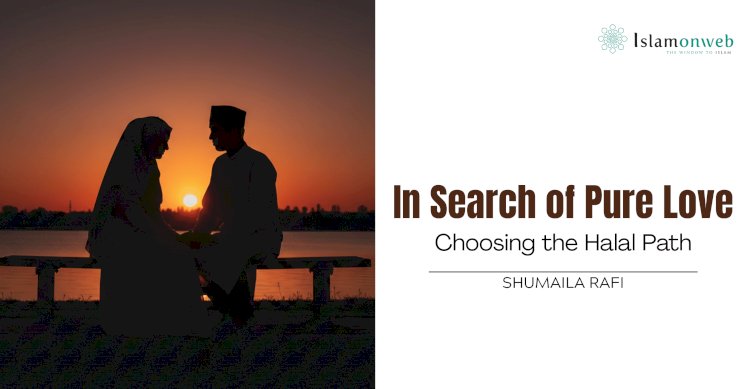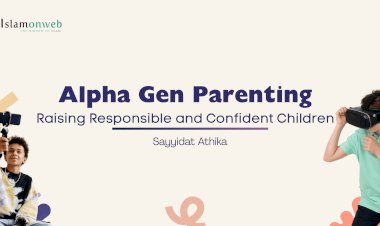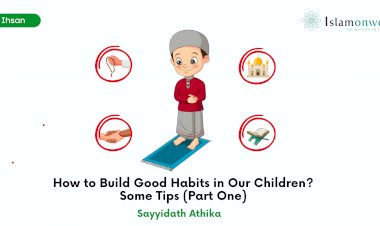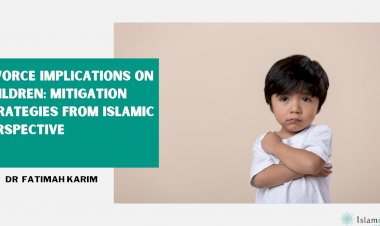In Search of Pure Love: Choosing the Halal Path
Love — a word that stirs the hearts of today’s youth more than any other. It can bring joy, but it can also lead to haste, secrecy, and heartbreak. Islam reminds us that love itself is not a sin; it is a natural human emotion, a gift placed in the heart by Allah. What truly matters is not the feeling itself, but the choices that follow.
The Prophet Muhammad ﷺ said:
“There is nothing like marriage for two who love one another.” (Ibn Majah)
Love before marriage, if it remains in the heart without forbidden interaction, carries no sin, as Ibn Ḥazm notes in Ṭawq al-Ḥamāmah through examples of love by dream, by mere description, or from a single glance. Yet true and lasting love, he affirms, only flourishes through companionship, familiarity, and good living together after marriage — the kind of bond that endures through the passing of nights and trials of life.
Through marriage, Islam dignifies love and transforms it into mercy, companionship, and worship. Yet in today’s world, temptations surround us, and modesty is often overlooked. For many young people, the halal path feels harder than the haram one. The question arises: how can we protect our hearts, remain sincere to Allah, and still seek companionship?
Barriers on the Halal Path:
For someone with sincere feelings, expressing them openly can feel overwhelming. Cultural barriers, family hesitation, and fear of rejection often discourage young people from choosing the halal route. In many societies, conversations about marriage are delayed until much later in life. Parents may dismiss youthful feelings as immaturity, while young people feel they have no safe space to express their intentions respectfully.
Instead of supporting openness, society sometimes drives them into secrecy. And secrecy is where hearts become vulnerable. It often begins innocently — a simple “salaam” online, a casual conversation at university, or a shared interest over social media. At first, it seems harmless. But slowly, those interactions grow into daily habits. Habits turn into emotional dependence, and judgment becomes clouded.
What began as a single friendly message can transform into an attachment that consumes energy, time, and even faith. This is how Shayṭān works: not through sudden leaps, but by gradual steps. Allah warns us in the Qur’an:
“O you who have believed, do not follow the footsteps of Shayṭān. And whoever follows the footsteps of Shayṭān — indeed, he enjoins immorality and wrongdoing.”
(Surah An-Nur 24:21)
When society fails to provide a safe halal path, Shayṭān opens the door to the haram one.
The Prophet ﷺ said: “Allah has written for the son of Adam his share of zina which he will inevitably get. The zina of the eyes is looking, the zina of the tongue is speaking, and the soul desires and wishes, and the private parts either confirm that or deny it” (al-Bukhārī, Muslim). A single glance may seem harmless, yet it plants seeds of attachment that the heart nourishes through imagination until it clings to what is forbidden. This is why guarding the eyes is the first shield of purity; once neglected, the heart becomes far more vulnerable to whispers that lead it away from the halal path.
Consequences of Haram Relationships:
When relationships are built outside the framework of Islam, they often struggle to survive — even if they later lead to marriage. Many real-life examples show that marriages born out of secrecy lack barakah (divine blessing).
Two key reasons explain this:
- They begin on a haram foundation, and sin rarely leads to lasting peace.
- Instead of entrusting matters to Allah, couples try to control outcomes on their own.
Relationships rooted in secrecy breed mistrust. When the very beginning involves hiding from parents, lying about interactions, or fearing exposure, the heart learns to operate in shadows. Later, when marriage comes, that same mistrust often lingers. A shaky foundation cannot support a strong building.
This is why so many marriages influenced by pre-marital attachments collapse under pressure. Love that is not rooted in obedience to Allah may bring short-lived happiness, but it rarely brings lifelong stability.
The Qur’anic Perspective on Pure Love:
The Qur’an beautifully frames the purpose of marriage as more than a contract — it is a divine sign. Allah says:
“And among His signs is that He created for you from yourselves mates that you may find tranquillity in them; and He placed between you affection and mercy. Indeed, in that are signs for a people who reflect.”
(Surah Ar-Rum 30:21)
This verse shifts our perspective entirely. Love in Islam is not just an emotion, but a pathway to sakīnah (tranquillity), mawaddah (deep affection), and raḥmah (mercy). When pursued through the halal path, love is elevated from fleeting desire to a reflection of divine wisdom. Companionship becomes worship, and marriage becomes a sign of Allah’s mercy.
What society portrays as restrictive is in reality liberating: a relationship free from fear, secrecy, and shame, built instead on respect, transparency, and trust.
The Blessings of Choosing Halal:
Choosing the halal path requires courage, but its blessings are profound:
- Peace of heart — freedom from guilt and anxiety.
- Protection from sin — safety from Shayṭān’s traps.
- Barakah in marriage — a bond blessed by Allah.
- Respect in society — no need for secrecy or shame.
- A clear conscience — the sweetness of obedience.
- Allah’s support — help in trials and difficulties.
Islam is not a religion of deprivation but of balance. Love is not haram; what matters is the path we choose to honour it.
Trusting Allah With Love:
So what should one do when the heart inclines toward someone? The answer lies in tawakkul — placing trust in Allah. If feelings are sincere, the first step is not a secret message but prayer. Perform two rakʿahs of ṣalāh, raise your hands in duʿā’, and entrust your heart to the One who never betrays trust.
Allah promises in the Qur’an:
“And whoever fears Allah — He will make for him a way out, and will provide for him from where he does not expect.”
(Surah At-Talaq 65:2–3)
This verse is not limited to finances. It applies to matters of the heart as well. If the person is truly good for you, Allah will bring them to you in ways you never imagined. If not, He will protect you from harm. When matters are left to Allah, the heart rests; when left to human schemes, it rarely finds peace.
Timeless Examples of Pure Love
The Qur’an gives us the shining example of Prophet Yusuf (A.S.), a young man who faced one of the most difficult tests of desire. When tempted by the wife of a ruler — powerful, persistent, and alluring — he turned to Allah with a heartfelt duʿā’:
“O my Lord, prison is more beloved to me than what they invite me to.”
(Surah Yusuf 12:33)
Despite being young, alone, and vulnerable, Yusuf (A.S.) chose imprisonment over sin. His decision was not easy, but it was pure — he placed Allah above desire, and Allah honoured him with dignity, freedom, and leadership.
His story reminds us that resisting temptation is not weakness; it is strength. It shows that love and attraction are not sins in themselves — but the true test is what we do with those feelings. If Yusuf (A.S.) could remain firm in a moment of such pressure, then today’s youth, too, can seek strength in Allah when facing whispers of Shayṭān.
Patience: The Hardest but Holiest Path
After choosing the halal path, the greatest test is patience. Shayṭān whispers: “No one does this anymore” or “You’ll miss your chance.” Social media fuels this fear by showing glamorous pictures of relationships, making patience appear outdated.
But the believer knows patience is not losing — it is trusting Allah’s timing.
Allah says:
“Indeed, with hardship comes ease.”
(Surah Ash-Sharh 94:6)
Every moment of patience carries unseen rewards. It strengthens the heart and prepares it for what is truly best. What looks like delay is in reality preparation — Allah shaping your heart for a love that is pure and lasting.
The Role of Parents and Society:
Youth are not alone in this struggle; families and communities play a critical role. Too often, sincere intentions are crushed because parents refuse to listen or understand. A young man or woman may approach with respect, only to be silenced with the words, “Not now” or “You are too young.”
Islam encourages openness and respect, not secrecy and rebellion. Parents must learn to guide with wisdom and compassion, remembering that the Prophet ﷺ never dismissed the struggles of youth. Instead, he offered them practical paths to purity.
If families support early marriages, respect halal proposals, and create spaces for healthy discussions, countless heartbreaks can be prevented. Communities should also create safe environments for young people to seek advice without fear of shame. It is time to stop fearing society and start fearing sin.
The Prophet ﷺ said: “There is nothing like marriage for two who love one another”. This principle was affirmed in practice. ʿAbd al-Razzāq al-Ṣanʿānī narrates that when a young man proposed to a woman who loved him but her family refused, Ṭāwūs was asked about it. He recalled the saying of the Prophet ﷺ, “There is nothing like marriage for two who love one another,” and instructed that the marriage be solemnised (al-Muṣannaf, 6/173).
Likewise, in it is reported from Jābir that a man told the Prophet ﷺ of a girl in their care who was sought by two men — one wealthy and the other poor — and though she inclined to the poor man, her guardians favoured the wealthy one. The Prophet ﷺ replied: “There is nothing like marriage for two who love one another.” (Kanz al-ʿUmmāl ) Such narrations guide parents to prioritise the sincerity of affection and compatibility over material advantage, ensuring that love is preserved through the halal bond of nikāḥ rather than suppressed by social calculations.
Ibn al-Qayyim explains that Allah has placed a remedy for every ailment, and the cure for desire lies in the lawful means He prescribed. If someone is struck by attraction, the Prophet ﷺ instructed: “If one of you is impressed by a woman and this stirs in his heart, let him go to his wife and fulfil his need with her, for that will repel what is in himself” (Ṣaḥīḥ Muslim, 4/130). Thus, just as he guided the loving pair to marriage, he directed the married to turn to their spouses as a treatment for temptation.
Conclusion:
Pure love is not lost. It exists — but it requires courage, patience, and trust in Allah. The path of obedience may feel uphill, but it leads to a destination filled with peace. The haram path may look easier, but it ends in regret.
When we submit our hearts to Allah, He guides us to what is best, even when we cannot see it. True love is not about chasing what we want; it is about trusting the One who knows what we need.
May Allah guide our generation toward sincerity, pure intentions, and halal love. May He grant peace to our hearts, strength to remain patient, and protection from the traps of haram. May He grant us marriages filled with sakīnah, mawaddah, and raḥmah. And may our love for Him always be greater than any love we feel for His creation.
Ameen!
About the author:
Shumaila Rafi is a student of Persian literature at Lahore College for Women University (LCWU), Pakistan. She has a deep interest in Islamic studies, youth psychology, and spiritual development. Her writing focuses on guiding today’s generation toward pure intentions, halal relationships, and a deeper connection with Allah.
References
- The Holy Qur’an. Translations from Surahs An-Nur 24:21, Ar-Rum 30:21, Yusuf 12:33, Ash-Sharh 94:6, and At-Talaq 65:2–3.
- Ibn Mājah, Muhammad ibn Yazīd. Sunan Ibn Mājah. Translated by Muhammad al-Khattab. Riyadh: Darussalam, 2007.
- (Sunan Ibn Mājah, 1847; al-Ḥākim, al-Mustadrak 2/160)
- ʿAbd al-Razzāq al-Ṣanʿānī, al-Muṣannaf, 6/173
- Ibn Ḥazm, Ṭawq al-Ḥamāmah, p.124
- Ibn al-Qayyim, Rawdat al-Muḥibbīn wa Nuzhat al-Mushtāqīn, p.309 (ʿAṭāʾāt al-ʿIlm ed.)
- Ibn al-Qayyim, al-Dāʾ wa al-Dawāʾ (al-Jawāb al-Kāfī), p.237 (Dār al-Maʿrifah ed.)
Disclaimer
The views expressed in this article are the author’s own and do not necessarily mirror Islamonweb’s editorial stance.
























Leave A Comment